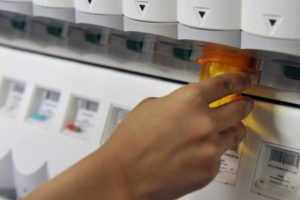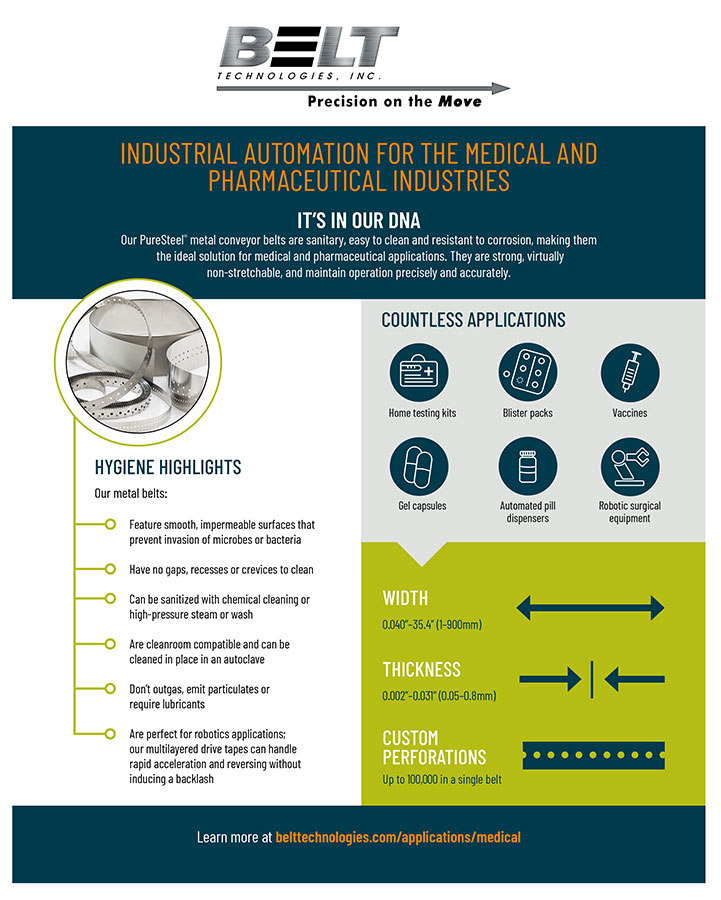 Belt Technologies has the capability to produce custom stainless steel belts for a variety of unique applications beyond conveyor belt systems. One such application includes an automated pill dispenser cabinet for a large, medical device OEM. The dispenser for these projects is designed with a series of drawers that house medications for secure storage. To ensure the prescription pills cannot be dispensed without proper authorization, each drawer is built with a unique metal belt made with specialized window perforations. These window perforations limit access to the medications in the drawer. Only the necessary dosage is reachable through the window.
Belt Technologies has the capability to produce custom stainless steel belts for a variety of unique applications beyond conveyor belt systems. One such application includes an automated pill dispenser cabinet for a large, medical device OEM. The dispenser for these projects is designed with a series of drawers that house medications for secure storage. To ensure the prescription pills cannot be dispensed without proper authorization, each drawer is built with a unique metal belt made with specialized window perforations. These window perforations limit access to the medications in the drawer. Only the necessary dosage is reachable through the window.
Stainless Steel Is Ideal for Medical Applications
Stainless steel is a great material choice for almost any automated medical application. Medical devices and materials are heavily regulated to maintain health and safety standards. They must be easy to clean and resistant to corrosion.
Stainless steel has a smooth, impermeable surface that offers no opportunity for microbes or bacteria to attach. Studies have shown that bacteria does not attach to the surface of stainless steel as readily as it does to other belt materials, such as rubber or plastic. This attribute is particularly valuable in clean room environments. Because it is highly resistant to corrosion, stainless steel can be cleaned via any method that best serves the application, from high-pressure steam washing to chemical cleaning. In addition, stainless steel belts do not generate particulates or require lubrication, which makes them an excellent choice for applications where prevention of contamination is a priority.
Achieve Precise Custom Perforations
Each drawer of these automated pill dispensers includes a metal belt with custom perforation patterns that are chemically etched. The larger “window” perforations are designed to enable access to the exact dosage required. They are then sent to a secondary operation that “folds” the outer edges of the window, which ensures a rounded surface that won’t scrape or cut attendant’s hands. A smaller perforation pattern on the edge of the belt is used as a part of the advanced optical positioning system. This allows the automated system to track which drawers are opened, who opened them, and how many times they were opened throughout the day.
Belt Technologies Can Produce Metal Belts for Unique Applications
The limited space within each drawer initially made these belts challenging to design and produce. The pulleys are very small, necessitating the use of thin belts. Despite these restrictions, our engineers were more than capable of producing belts that fit the customer’s design. The end result was a belt that is 3.770” wide x 0.005” thick x 43.946” long. We produce the belts in a variety of stainless steel grades for the customer, including 301, 302, 304, or 316 Full Hard Stainless Steel. We produce each automated pill dispenser according to the needs of the hospitals that purchase them; they can be built in a variety of configurations. On average, Belt Technologies produces up to 200 of these belts at a time.
At Belt Technologies, our engineers have the knowledge and experience to produce stainless steel belts for a wide variety of applications. Do you have a unique automated design that would benefit from the properties of stainless steel? Contact us today to learn more.



